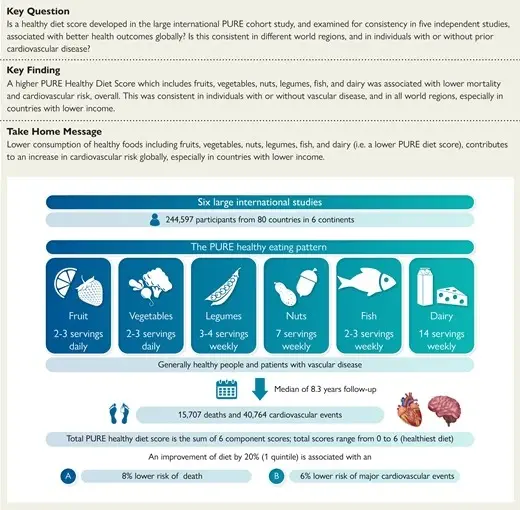Consuming fruits, vegetables, legumes, nuts, fish and whole-fat dairy products is key to lowering the risk of cardiovascular disease, including heart attacks and strokes. The study also found that a healthy diet can be achieved in various ways, such as including moderate amounts of whole grains or unprocessed meats.
The World Health Organization estimates ~18 million people died from cardiovascular disease in 2019, representing 32% of all global deaths. Of these deaths, 85% were due to heart attacks and strokes. Population Research Health Institute researchers and their global collaborators analyzed data from 245,000 people in 80 countries from multiple studies.



This is interesting and something I’ve not heard of - can you recommend a starter link for someone with a basic stats background? I had some in undergrad, but this sounds like a topic that could get very tinfoil-hat-y if not searched correctly and with good context.
There’s still a lot of debate around this topic. It’s obviously difficult for people who have used these methods for the past 60 years to simply say “I’ve been using a flawed method for 60 years” – although in the end that’s how science works. The problem moreover is double: the method has built-in flaws, and on top of that it’s often misused.
Some starters:
The official statement by the American Statistical Association
A follow-up editorial
Signatories for the dismissal of the method
Many papers explaining the built-in flaws, from this old 1935 paper and this old 1965 discussion, to more recent ones; for example this, or this, or this, or this, or this tutorial
This paper gives a good summary
Journals that don’t accept “statistical significance” methods anymore: this or this
Several books, for example this one. I agree with the factual content of this book, but I don’t like the authors’s braggart way of writing. In their defence, though: it’s the same braggart way of writing that R. A. Fisher, the father of “statistical significance”, often had.
What’s sad is that these discussions easily end in political or “football-team”-like debates. But the mathematical and logical proofs are there, for those who care to go and read them.
Thanks, I appreciate it - looks like I’ve got some bedtime reading for awhile :)
My pleasure!